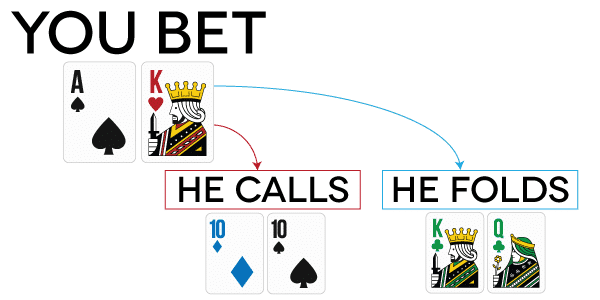What’s up guys? It’s Hunter Cichy (@HunterCichy) and I’m back with my second article for RedChipPoker.com. Last month I gave you guys my bio and talked about how the amount of information your opponent is processing determines what your goals are in the hand, especially in 3-bet pots. This month I want to give you some examples.
Let’s start by discussing AK. I think AK is the most misplayed hand in poker. A lot of players 3-bet and c-bet AK and then check it down if they get called. Other players try to fire every street with it. Others never c-bet with it. You really need to evaluate the merits of each play before you say that one of them is empirically better than the others.
Let’s say the CO opens, you 3-bet the BTN with AK, and the CO calls. The flop is 7♠ 4♣ 2♥. Villain checks. I constantly see players firing away here with no plan for the hand. In most spots like this you should just ask yourself if you’re getting enough outright fold equity when you c-bet. Most people like to use a half-pot bet in 3-bet pots. A half-pot bet needs Villain to fold 1/3rd of the time to be profitable.
You think Villain is folding half the time in this example. So you should fire right? Not necessarily. You need to consider what will happen if you check. Is there a MORE profitable line in this situation? Who are you playing against? Is he considering your hand strength?
Ah, now you see why I stressed leveling so much. The player in this hand is a level two thinker. He isn’t really considering your hand. You 3-bet him pre-flop for value because you thought he would call a raise with too many dominated Broadway combinations. So when you c-bet this flop what are you accomplishing? You are getting all of his worse Broadway hands to fold and all of his pocket pairs to call. You’re helping him to play perfectly. That’s obviously not what you want to do.

So what if you check the flop? Oh, you’re afraid Villain will bluff you off the best ace high? Again, remember which level he’s on. He’s on level two. He isn’t considering your cards; therefore, he’s not actively trying to utilize fold equity. So we’ve established that he’s not going to bluff the turn. How does that alter the composition of his ranges? Firstly, if he leads the turn he has a pocket pair or the turn made him a pair. If he has a pocket pair you just saved yourself a bet by not firing the flop. He will also rarely turn a pair. Remember that AK dominates most of his range. That’s why you 3-bet him in the first place. If the turn is a jack and he has AJ, just say nice hand. Then, consider the times he has AJ and an ace comes off. You lose nothing but the pot when he hits a jack and you gain the pot plus two streets of value when he hits an ace. Do you see where I’m going with this? You’re utilizing implied odds by checking ace high on the flop.
What about the times that you’re playing against level three, four, or five thinkers? Then this spot is a little different. I’m not a huge fan of trying to make ace high calls but this is one of the spots where it’s good a lot of the time. Most higher level thinkers realize that you have mostly ace high when you check the flop in position in a 3-bet pot. How does that change their actions?
Firstly, they habitually lead the turn and the river with air. That’s great for us. Ace high is exactly that same as AA in this spot. Why? Most opponents realize that you have ace high and check an overpair a second time in this spot to try to induce you to bluff. Do you see how off balance that range is? Even if they lead the turn with all of their pocket pairs you should still be calling because Broadway combinations significantly overwhelm pocket pair combinations. So the only time you should be folding ace high on a blank turn is when you think your opponent is only leading the turn with pairs and always checking air. You’re going to have to call Villain down a few times with ace high before he decides to adjust in that manner.
BROADWAY HAND
POCKET PAIR
But isn’t your c-betting range off balance since you’re usually checking back ace high? No, not really. Remember that you’ll be barreling with non-ace high hands when you 3-bet and think that you have enough pot equity and/or fold equity to continue betting. You only have to throw in a few non-ace high Broadway combinations that flop backdoor flush draw and/or backdoor open-ended straight draw potential.
Let’s say the CO opens and you 3-bet from the BTN with Q♣ J♣ because you think 3-betting will produce more profitable situations than flatting. He calls and the flop comes T♣ 4♦ 2♠. This is a spot where you need to utilize your fold equity and backdoor equity to create extra value and balance your c-betting range. Understand that any ace, king, queen, jack, nine, eight, or club improves your hand and allows you to immediately determine how much equity you have on the turn. In some senses this is an easier spot to play than if you had Jacks. Jacks have a very static amount of equity versus your opponent’s range. Q♣ J♣ has a very dynamic equity that is easy to interpret.
One more thing, if you ever 3-bet and see a spot where your opponent is stabbing turns WAY too much, consider checking back overpairs too. You’re rarely going to get three streets of value from a one pair hand; however, it’s possible to create extra value from the air part of your opponent’s range if you have a good read on his aggression frequencies on the turn. To summarize, 3-bet pots are very dynamic. They are highly dependent on how much information your opponent is processing and even more dependent on game flow. Understand how Villain views your range, estimate how that changes his range, and figure out how to change your range to exploit Villain. It’s not that hard, especially against amateur players that aren’t considering your range.
This is Hunter Cichy signing off on 3-bet pots! Run good, have fun, and constantly look for ways to improve.

Nice article, enjoyed it 🙂
Thanks Hunter — and congrats on your big 2nd place cash in Event #64: WSOP.com Online No-Limit Hold’em — nice one!
Hi Hunter,
Nice post thanks.
When referring to levels, did you not meant that villain is on level one?
Level two is when he is thinking about what hand you could have.
Seb